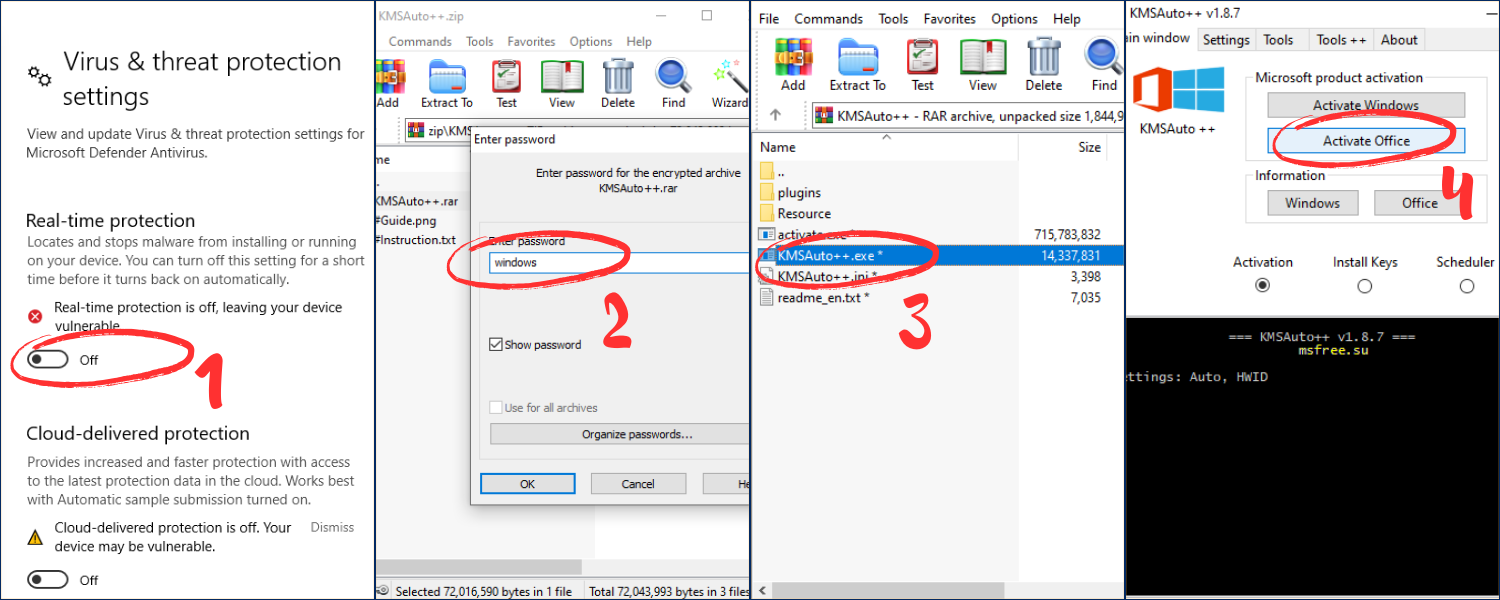Microsoft Office 2021 Activator Download
| 💡 Version: KmsAuto 2025 🖥️ Operating System: Windows 💿 License: Free 🏢 Developer Name: Ratiborus 📊 Total Downloads: 127,891 ➡️ Category: KMS Activator Tools |
About KMSAuto++
KMSAuto++ – this activator might activate any version of Office and Windows, including MS Office 2021. The program provides several activation methods, including activation via Key Management Service (KMS) and activation via server emulation.
It automatically finds and activates installed Microsoft products, providing seamless activation without the need to manually enter activation keys. The whole procedure takes place automatically after pressing the button on the activator.
Pros:
| Cons:
|
Supported programs of Microsoft Office
|
|
Microsoft Office 2021 is a collection of the most important updates introduced in the Office 365 and Microsoft 365 services over the past two years. Of course, those that can function properly in offline mode and without a cloud environment.
Several really interesting features have appeared in the most important applications of the suite. The developers have also introduced general changes to the suite as a whole, improving the overall performance and increasing the comfort of working not only with files, but also the entire Windows environment.
You can Download MS Office 2021 from the trusted website.
Download KMSAuto Activator Latest Version
- Step 1: Copy the link and paste into new tab, press enter.
- Step 2: Download the file.
- Step 3: Find the archive in the “Downloads” folder.
How to Use KMSAuto?
- Step 1: Temporary disable AntiVirus or Windows Defender. It is needed for they don’t block the Activator.
->Instruction to disable in: Windows 10 | Windows 11<- - Step 2: Go to the folder with activator, open the Archive, using WinRaR.
Password for the Archive – “windows“. - Step 3: Open the file “KMSAuto++.exe“.
- Step 4: Press on “Activate Office” buttons.
- Step 5: Wait 20 seconds.
Frequently Asked Questions (F.A.Q.)
Here are a few of the questions that we most often get from site visitors. If you have any more questions, post them in the comments, please.
Is Office activator dangerous?
KMSAuto is not a dangerous software. Biggest concerns about this application arises when tool have been downloaded from unsafe & not verified sources. It is a completely safe and secure open source program that is used to activate Microsoft products such as MS Windows or MS Office. Using this tool, a user can activate any of their installed product without even purchasing a serial key or any kind of product key from Microsoft.
Why KMSAuto++ tool is not working on my device?
There might be actual multiple different reasons in this occasion. Most common case: software was started without admin rights. Try to re-launch application by running it as administrator. Secondly, you should try to add exception in your antivirus or real-time protection settings to run the main KMS Pico activator.
What are the alternatives to KMSAuto?
The tools with the same characteristics – Microsoft Toolkit, KMSPico – very good activator, you can use also KMS Tools. On the internet have more tools, you can find them in Google.
Download KMSAuto
Office 2021 Activator
Office Activador Descargar
Why need to disable Windows Defender or Antivirus?
Once you have temporarily turned off the Antivirus and the Window Defender, you get the opportunity to run programs such as an activator. Otherwise, this is not possible, since antiviruses block the file as dangerous and delete it.
Conclusion
So, if you are also searching for an activator that provides the permanent activation for Microsoft products then this could be a great choice for you.
In the end, I would like to say that if you really love my article or you find it helpful then please share it with your friends and let them know about these activators.
Sharing is Caring: Please Share With Friends And Family



